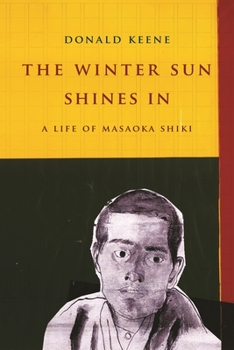The Winter Sun Shines in: A Life of Masaoka Shiki
(Part of the Asia Perspectives: History, Society, and Culture Series)
Select Format
Select Condition 
Book Overview
Rather than resist the vast social and cultural changes sweeping Japan in the nineteenth century, the poet Masaoka Shiki (1867-1902) instead incorporated new Western influences into his country's native haiku and tanka verse. By reinvigorating these traditional forms, Shiki released them from outdated conventions and made them more responsive to newer trends in artistic expression. Altogether, his reforms made the haiku Japan's most influential...
Format:Paperback
Language:English
ISBN:0231164890
ISBN13:9780231164894
Release Date:March 2016
Publisher:Columbia University Press
Length:240 Pages
Weight:0.70 lbs.
Dimensions:0.8" x 5.0" x 8.0"
Grade Range:Postsecondary and higher
Customer Reviews
0 rating





